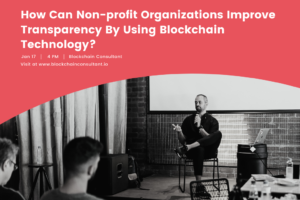Non-profit organizations play a crucial role in addressing societal problems and supporting communities. These entities must operate with transparency to maintain the trust of their stakeholders and donors.
With the advent of blockchain technology, non-profit organizations can benefit from increased transparency and accountability in their operations. The decentralized structure of blockchain ensures that transactions are secure, immutable, and cannot be altered or deleted by any central authority.
This makes it an ideal tool for non-profits seeking to improve accountability and transparency. By implementing blockchain technology, non-profits can improve their financial record-keeping, increase donor confidence, and foster greater trust among stakeholders.
This article will show you how non-profits can increase their transparency through blockchain technology. At the end of this article, you will learn:
- Non-profits’ transparency challenges
- How blockchain technology can solve the transparency problems?
- How can Blockchainconsultant.ion help non-profits?
Let’s first learn the transparency challenges non-profits face and then we will know how blockchain can solve them.
Transparency Challenges Non-profits Face
The public’s faith in non-profit organizations has declined significantly in recent years. This tendency is accelerating in the United States and the United Kingdom, two of the main donor countries whose governments have opted to reduce assistance funding. Here are some examples of transparency issues that happened with NPOs.
Following the 2010 earthquake in Haiti, the American Red Cross raised $488 million to provide homes for over 130,000 people. In reality, there were just six permanent residences constructed. According to internal documents, the organization recruited the incorrect locals for this project.
The Minnesota Senate requested an investigation into whether $100 million from the state’s welfare program (CCAP) was moved in suitcases to finance a terrorist group in Somalia in the Personal Care Attendant incident.
Following these incidents, people and governments are losing their trust in helping NPOs. There are some other problems too. Read below to know those:
Financial Transparency
Non-profit organizations must be transparent about their finances to build trust with stakeholders. However, financial transparency can be challenging due to the complexity of non-profit accounting, the lack of trained staff, and the variation in financial reporting standards.
Operational Transparency
Operational transparency refers to the organization’s decision-making processes, operations, and policies. It is essential to maintain transparency in these areas to gain the trust of stakeholders.
Communicating Transparency
Non-profit organizations must communicate their transparency efforts consistently and clearly. This can be challenging because not all stakeholders are aware of what transparency entails, and every stakeholder group prefers receiving information according to their expectations.
Balancing Transparency and Confidentiality
Non-profit organizations must balance transparency with confidentiality, especially when dealing with sensitive information such as donor information or personal data. A breach of privacy can destroy trust between the organization and its stakeholders.
Blockchainconsultant.io can help NPOs to have better transparency through blockchain. We can provide consultancy and help to implement suitable blockchain technology for your NPO. Our experts can help you to solve these challenges and make your NPO activities more transparent.
How Can Blockchain Technology Solve The NPOs Transparency Issues?
Blockchain technology can improve transparency in non-profit organizations in several ways:
- Donor Transparency: Blockchain technology can be used to create a decentralized ledger of transparent transactions, enabling donors to know exactly where their money is going and how it is being spent. This creates trust and accountability for the organization.
- Auditability: Blockchain technology can also help non-profits maintain accurate records and easily track their financial records. This makes it easier for auditors to verify financial records, ensuring that the organization is operating in an accountable and transparent manner.
- Smart Contract: Smart contracts built on a blockchain network can be used to create automated and transparent agreements between non-profits and their stakeholders. This can help to reduce administrative costs and improve transparency and accountability.
- Public Records: By making use of public blockchain networks, non-profits can share their records in real-time with donors, experts, and regulators, enhancing the transparency of their operations.
- Immutable Data: Blockchain technology can ensure that records can’t be tampered with, providing a permanent and immutable record of financial transactions, and reducing the likelihood of fraud and corruption.
Examples of NPOs Using Blockchain Technology for Transparency
- The World Food Programme (WFP): The WFP has been utilizing blockchain technology to distribute aid to Syrian refugees in Jordan. The platform allows refugees to purchase food and other supplies using cryptocurrency, which is then converted to local currency and transferred to local merchants. This program has helped to increase transparency and reduce costs associated with aid distribution.
- GiveCrypto: GiveCrypto is a nonprofit organization that uses blockchain technology to provide aid to people living in poverty. The organization provides direct cash transfers to people in need using cryptocurrency, which eliminates the need for intermediaries and reduces fees.
- Unicef CryptoFund: In 2019, Unicef launched a CryptoFund to accept donations in cryptocurrency. The funds received are used to support technology and blockchain solutions that help children and young people in developing countries.
- BitGive: BitGive is a Bitcoin donation platform that has been operational since 2013. The organization uses blockchain technology to track donations and ensure that they are delivered to their intended recipients. BitGive has partnered with various nonprofit organizations to provide aid to people affected by natural disasters and other emergencies.
- Blockchain for Social Impact Coalition (BSIC): BSIC is a coalition of organizations that are working to address social and environmental challenges using blockchain technology. The group focuses on projects related to identity, supply chain management, financial inclusion, and energy efficiency.
Final Thoughts
In this article, we tried to address a major issue that non-profits face. Transparency may not be their ultimate goal, but it is undoubtedly an obstacle that prevents them from attaining their objectives. We understand that implementing new technology is never simple and requires significant work, especially when it comes to financial reporting software that will be utilized by a full ecosystem of conservative service providers. Contact us today to implement, train, and track your blockchain implementation for your NPO.
















